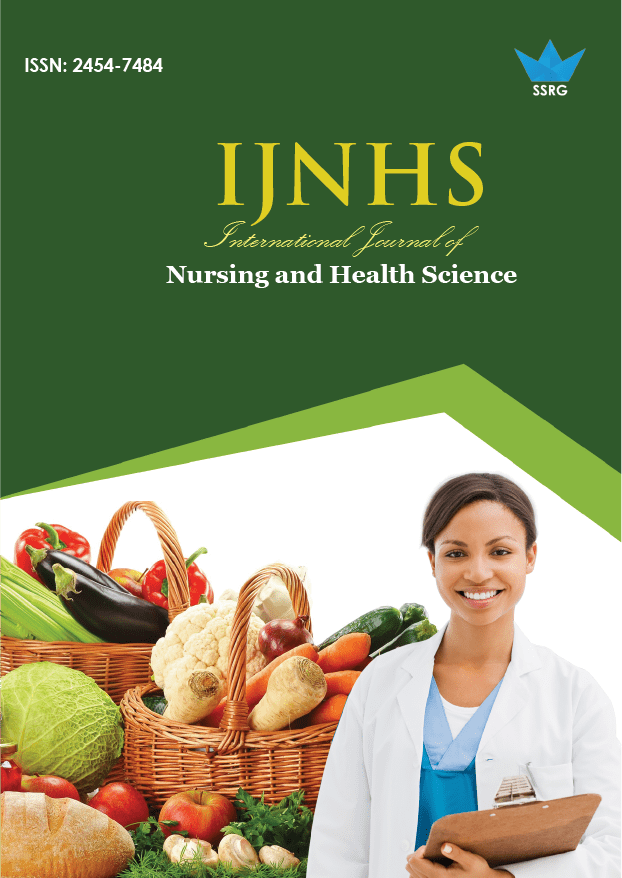A Descriptive Study To Assess The Knowledge Regarding Danger Signs of Neonatal Illness Among Postnatal Mothers In SMI Hospital Dehradun” In A View To Develop An Information Booklet

| International Journal of Nursing and Health Science |
| © 2021 by SSRG - IJNHS Journal |
| Volume 7 Issue 1 |
| Year of Publication : 2021 |
| Authors : Paonam Chanu Dineshwori, Priti Rebecca, Kirti Harjai |
How to Cite?
Paonam Chanu Dineshwori, Priti Rebecca, Kirti Harjai, "A Descriptive Study To Assess The Knowledge Regarding Danger Signs of Neonatal Illness Among Postnatal Mothers In SMI Hospital Dehradun” In A View To Develop An Information Booklet," SSRG International Journal of Nursing and Health Science, vol. 7, no. 1, pp. 7-11, 2021. Crossref, https://doi.org/10.14445/24547484/IJNHS-V7I1P102
Abstract:
A study was conducted to assess the knowledge regarding danger signs of neonatal illness among postnatal mothers in SMI Hospital Dehradun, in view of developing an information booklet. The research design selected was one descriptive study. The setting was Shri Mahant Indiresh Hospital, Dehradun. 80 postnatal mothers were selected using a convenient sampling technique. A self-developed knowledge questionnaire regarding the dangerous sign of neonatal illness was used to collect the data. The result of the study showed that (3.75%) of postnatal mothers had adequate knowledge, (48.75%) had a moderate level of knowledge, and (47.5%) had an inadequate level of knowledge. Thus, the study concluded that the majority of postnatal mothers have moderate knowledge regarding danger signs of neonatal illness which states that there was a lack of knowledge regarding danger signs of neonatal illness.
Keywords:
Knowledge, Danger Signs, Neonatal illness, Postnatal mothers
References:
[1] Boulvain M, Perneger TV, Othenin-Girard V, Petrou S, Berner M, Irion O. Home-based versus hospital-based postnatal care: a randomized trial. BJOG. 111 (2004) 807–13.
[2] Gagnon AJ, Dougherty G, Jimenez V, Leduc N. Randomized trial of postpartum care after hospital discharge. Pediatrics., 109 (2002) 1074–80.
[3] Sainz Bueno JA, Romano MR, Teruel RG, Benjumea AG, Palacín AF, González CA, et al. Early discharge from obstetrics-paediatrics at the Hospital de Valme, with domiciliary follow-up. AJOG. 193 (2005) 714–26.
[4] Chowdhury HR, Thompson S, Ali M, Alam N, Yunus M, Streatfield PK. Causes of neonatal deaths in a rural subdistrict of Bangladesh: implications for intervention. J Health Popul Nutr., 28 (2010) 375–82.
[5] Baqui AH, Darmstadt GL, Williams EK, Kumar V, Kiran TU, Panwar D, et al. Rates, timing and causes of neonatal deaths in rural India: implications for neonatal health programs. Bull World Health Organ. 8 (2006) 706–13.
[6] Indian Council of Medical Research Young Infant Study Group. The age profile of neonatal deaths. Indian Pediatr. 45 (2008) 991–4. Viswanathan R, Singh AK, Basu S, Chatterjee S, Sardar S, Isaacs D. Multi-drug resistant gram-negative bacilli causing early neonatal sepsis in India. Arch Dis Child Fetal Neonatal Ed. ; 97 (2012) 182
[7] Ogunlesi TA, Ogunfowora OB, Osinupebi O, Olanrewaju DM. Changing trends in newborn sepsis in Sagamu, Nigeria: bacterial aetiology, risk factors, and antibiotic susceptibility. J Paediatr Child Health., 47 (2011) 5–11.
[8] Anwer SK, Mustafa S, Pariyani S, Ashraf S, Taufiq KM. Neonatal sepsis: an etiological study. J Pak Med Assoc., 50 (2000) 91–4.
[9] Anand NK, Gupta AK, Mohan M, Lamba IM, Gupta R, Srivastava L. Coagulase negative staphylococcal septicemia in newborns. Indian Pediatr., 28 (1991) 1241–8.
[10] Bhutta ZA, Naqvi SH, Muzaffar T, Farooqui BJ. Neonatal sepsis in Pakistan. Presentation and pathogens. Acta Paediatr Scand., 80 (1991) 596–601.
[11] https://www.medindia.net.>episiotomy
[12] https://www.researchgate.net
[13] https://www.midicinenet.com

 10.14445/24547484/IJNHS-V7I1P102
10.14445/24547484/IJNHS-V7I1P102